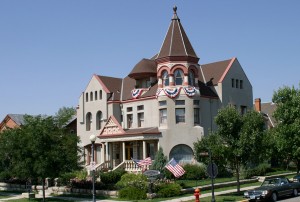By Nicholas Kralev
The Washington Times
April 6, 2009
When was the last time you stayed at a bed and breakfast? Are you planning to do it again soon? Or are you one of those travelers who have become so addicted to collecting points for “free” stays through hotel loyalty programs that you’d rather put up with monotonous chain hotels than visit smaller but more original properties?
If you are, then we are very much alike. The last B&B I stayed at was up in the Shetland Islands, in the very north of Scotland, 14 years ago. During the past decade, I’ve convinced myself that monotonous is not necessarily bad — in fact, although one could hardly distinguish hotels from the same chain in different cities or even countries, one always knows what to expect.
Comfort is one of the most important things to me when I travel — particularly on business — so I’m willing to sacrifice excitement for familiarity. Not that I don’t like surprises, but between a bad surprise and no surprise, I’d choose the latter. After all, it was very difficult in the past to know what to expect at a B&B in a foreign country.
In the Internet age, however, that excuse is no longer valid. Thanks to specialized Web sites, such as BedandBreakfast.com and BnBFinder.com, you can get a pretty good idea about a property and what it has to offer long before you get there. You can see photographs, read reviews from other travelers and compare a B&B with other ones in the area.
Tens of thousands of people apparently use those and similar sites to book their accommodations around the globe. There are no official statistics about how the current recession is affecting B&Bs, but some limited data suggest that properties in second-tier markets, where visitors drive from big cities, are doing better than last year.
A survey conducted last month by BedandBreakfast.com, which describes itself as “the largest online B&B directory and reservation network worldwide,” showed that more than 85 percent of respondents stayed at a B&B in the past two years. What is more curious, though, is that 96 percent stayed at a hotel, too. Respondents were self-selected and travel more than the average person.
“A significant number of respondents mentioned the relaxing appeal of B&Bs in their survey comments,” said Eric Goldreyer, founder and chief executive officer of BedandBreakfast.com. “We know people are flying less, driving more and are often cutting back on the length of their vacations. Yet this survey demonstrates that, as economic pressures mount, vacations continue to be a necessity to relieve stress.”
So what do travelers like most about B&Bs? About 85 percent of survey participants cited the free breakfast and the innkeepers’ hospitality. About 74 percent cited each place’s “individuality” and the opportunity of “a new experience every time,” while about 55 percent said they “appreciate the distinctive furnishings.” More than one answer could be chosen.
What about room rates? One of the attractions of B&Bs has been the perception that they are cheaper than hotels. According to a list of U.S. properties on BnBFinder.com, prices range from $35 to $600 a night, depending on location, room type, amenities, etc.
In some cases, hotels in a particular area may be cheaper than a B&B a few blocks away, which is especially true today, when many hotels are cutting rates in hope of reversing the slump in demand.
If the prices at a B&B don’t always beat those at a nearby hotel, its character most likely does. BnBFinder.com showcases the unique features of various properties on its blog. Last week, it focused on places that offer the old English ritual and social pastime of afternoon tea.
“Tea is a celebratory event at Nagle Warren Mansion Bed & Breakfast in Cheyenne, Wyo. Whether you decide to have tea for one or tea for twenty, the B&B staff is dressed smartly in period costumes and ready to serve seasonal favorites, such as maple scones, pecan tarts, apricot pecan bread, bourbon brownies and the B&B’s tea of choice, Earl Grey,” the blog states.
Jim Osterfoss, Nagle Warren’s owner, said the recession hasn’t affected business significantly. “Bookings are looking good for the summer, though they are not at record levels,” he said.
“The market is firming up. The good news is, it doesn’t take two swipes of a credit card to fill up the tank, like it did last summer,” Mr. Osterfoss said.
This column was first published by The Washington Times

